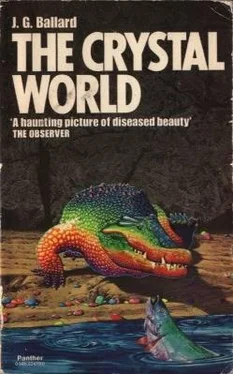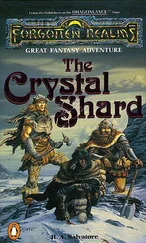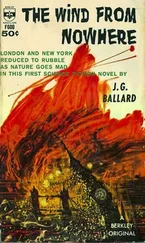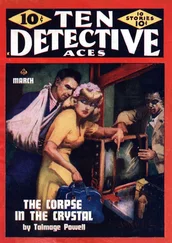Later, the noise began again. The engine of an antiquated truck was being hand-started in the compound. As it coughed and sneezed and the voices chattered around it, he heard more footsteps running in and out of the chalets. All the servants seemed to be up, wandering in and out of the rooms across the courtyard and slamming the cupboard doors.
When he saw someone with a torch inspecting the vegetation outside his window Sanders climbed from his bed and dressed.
In the dining-room of the chalet he found one of the houseboys looking through the open window into the forest.
"What's going on?" Dr. Sanders asked. "What the devil are you doing in here? Where's Dr. Clair?"
The houseboy pointed toward the compound. "Dr. Clair with truck, sir. Trouble in forest, he go to look."
"What sort of trouble?" Sanders walked over to the window. "Is the forest moving nearer?"
"No, sir, not moving. Dr. Clair say you sleep, sir."
"Where's Mrs. Clair? Is she around?"
"No, sir. Mrs. Clair busy now."
"What do you mean?" Dr. Sanders pressed. "I thought she was on night duty. Come on, man, what is it?"
The houseboy hesitated, his lips soundlessly forming the polite formulas which Max had left him for Sanders's benefit. He was about to blurt something out when the sound of footsteps crossed the courtyard. Sanders went to the door as Max Clair came toward him, followed by two porters.
"Max! What's going on-are you starting to evacuate?"
Clair stopped in front of him. His mouth was clenched, his chin lowered so that the sweat on his domed head shone in the torch-light. "Edward-have you got Suzanne in there with you?"
"What?" Sanders stepped back from the door, beckoning Clair inside. "My dear fellow- She's gone! Where?"
"I wish we knew." Clair walked up to the door. He glanced inside the chalet, uncertain whether to take advantage of Sanders's gesture. "She went off a couple of hours ago, God only knows where-you haven't seen her?"
"Not since earlier this evening." Sanders began to button the sleeves of his shirt. "Come on, Max, let's go after her!"
Ciair held up his hand. "Not you, Edward. I have enough problems, believe me. There are one or two settlements up in the hills," he said, unconvincingly. "She may have gone to visit the sick-bays. You stay here and keep things together-I'll take the Land-Rover and a couple of men. The others can go in the truck and keep an eye on the Bourbon Hotel."
Sanders began to argue with him, but Clair turned and strode off. Sanders followed him into the drive and watched him climb into the car.
Sanders turned to the houseboy. "So she's gone back into the forest-poor woman!"
The houseboy glanced at him. "You know, sir?"
"No, but I'm certain all the same. Each of us has something we can't bear to be reminded of. Tell the driver of the truck to wait, he can give me a lift down to the hotel."
The houseboy held his arm. "You going, sir-to the forest?"
"Of course. She's there somewhere-that's a judgment on myself I have to acknowledge."
The antiquated engine of the truck had come to life, its din throbbing all over the hospital. As Sanders climbed over the tailboard it started off and made a slow circuit of the fountain. Half a dozen of the native orderlies sat up behind the driver.
They reached the main highway five minutes later, then rumbled on through the darkness towards the white hulk of the Bourbon Hotel. The truck stopped in the weed-grown drive, its searchlight playing on the forest. As it swept across the crystalline trees, like an immense tipping of broken glass, the white prisms glittered as far away as the river half a mile to the south.
Jumping down from the tailboard, Dr. Sanders went over to the driver. None of the men had seen Suzanne leave, but from their careful watch over the forest they obviously all assumed that she had entered it. However, from the confused mêlée around the vehicle it was equally plain that they had no intention of following Suzanne. When Sanders pressed the driver he made some muttered reference to the "white phantoms" that patrolled its inner reaches-glimpses, perhaps of Ventress and Thorensen in pursuit of each other, or of Radek stumbling toward his lost grave.
Five minutes later, when he saw that the search party was no closer to forming itself-the driver insisted on remaining by his searchlight, and the other men had moved off to the Bourbon Hotel and squatted down with their cheroots among the fallen columns-Dr. Sanders set off alone along the highway. To his left, the glitter of the forest threw the cold moonlight across the macadam at his feet, and lit up the entrance to a small side-road that ran toward the river. Sanders looked down this narrow defile that led away into the illuminated world. For a moment he hesitated, listening to the fading voices of the natives. Then he pressed his hands into his pockets and moved along the verges of the road, picking his way among the glass spurs that rose more and more thickly around him.
In fifteen minutes he reached the river, and crossed a ruined bridge that tilted down on to the frozen surface like a jeweled web, its girders hung with silver. The white surface of the river wound away around the frosted trees. The few craft along the banks were now so heavily encrusted that they were barely recognizable. Their light seemed darker and more intense, as if they were sealing their brilliance within themselves.
By this time his suit had begun to glow again in the dark, the fine frost forming crystal spurs on the fabric. Everywhere the process of crystallization was more advanced, and his shoes were enclosed within bowls of prisms.
Mont Royal was empty. Limping in and out of the deserted streets, the white buildings looming around him like sepulchers, he reached the harbor. Standing on the jetty, he could see across the frozen surface of the river to the cataract in the distance. Even higher now, it formed an impenetrable barrier between himself and the lost army somewhere to the south.
Shortly before dawn he walked back through the town, in the hope of finding the summer house where Thorensen and his dying bride were sheltering. He passed a small patch of pavement that remained clear of all growth, below the broken window of one of the mine depositories. Handfuls of looted stones were scattered across the pavement, ruby and emerald rings, topaz brooches and pendants, intermingled with countless smaller stones and industrial diamonds. This abandoned harvest glittered coldly in the moonlight.
As he stood among the stones Sanders noticed that the crystal outgrowths from his shoes were dissolving, melting like icicles exposed to sudden heat. Pieces of the crust fell away and deliquesced, vanishing into the air.
Then he realized why Thorensen had brought the jewels to the young woman, and why she had seized on them so eagerly. By some optical or electromagnetic freak, the intense focus of light within the stones simultaneously produced a compression of time, so that the discharge of light from the surfaces reversed the process of crystallization. Perhaps it was this gift of time which accounted for the eternal appeal of precious gems, as well as of all baroque painting and architecture. Their intricate crests and cartouches, occupying more than their own volume of space, so seemed to contain a greater ambient time, providing that unmistakable premonition of immortality sensed within St. Peter's or the palace at Nymphenburg. By contrast, the architecture of the twentieth century, characteristically one of rectangular unornamented façades, of simple Euclidean space and time, was that of the New World, confident of its firm footing in the future and indifferent to those pangs of mortality which haunted the mind of old Europe.
Dr. Sanders knelt down and filled his pockets with the stones, cramming them into his shirt and cuffs. He sat back against the front of the depository, the semi-circle of smooth pavement like a miniature patio, at whose edges the crystal undergrowth glittered with the intensity of a spectral garden. Pressed to his cold skin, the hard faces of the jewels seemed to warm him, and within a few seconds he fell into an exhausted sleep.
Читать дальше
Конец ознакомительного отрывка
Купить книгу










